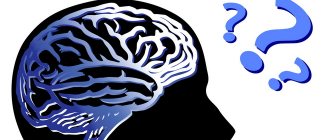Description
Memory is a person’s ability to store information about events and sensations that happened to him, as well as in the external environment, to reproduce and process stored information. Separate areas of the brain are responsible for all these processes.
Important! The ability to remember is not innate, which is why most people do not have memories of early childhood. Memory is closely related to speech function and begins to be used only when children learn to speak.
The number of nerve cells involved in this process corresponds exactly to the memory capacity, as well as the time during which the brain is able to store the information received. There are three main types of memory - short-term, long-term and sensory. In order to retain this or that information for a long time, it is necessary that it move from short-term to long-term memory.
This process can occur on its own, but if necessary and certain skills, it can be started “manually”. This is exactly what people do when they say their memory is bad and needs to be improved.
Modern technologies
The world does not stand still. Humanity is constantly developing and moving forward, and you need to be able to use this. Today you can find a huge number of tablet programs to improve memory and concentration. Explore each application, find the one that suits you best, and get started.
There are programs for memorizing pictures and the details depicted on them. There are programs that offer to memorize series of numbers, increasing the number with each level. Other apps offer retelling or summary.
For example, there is a project BrainApps.ru
, where you can take a test for thinking, memory, attention and, according to your indicators, develop them on various gaming simulators that are being developed by scientists from Moscow State University. Lomonosov
You see, these are all the same methods as before, only in a more convenient form.
Many of these apps offer simple exercises that won't cause any problems. Of course, it will be much easier for the child to cope with them. But it is worth remembering that adults suffer from rigid thinking. This is all trainable.
So don't be alarmed if you don't succeed the first time, if your results are lower than you expected. Over time, your achievements will become more and more significant. You will find your own characteristics.
There are people who remember visual information better, while others find it easier to perceive it auditorily. Be aware of these features of yours. This will greatly simplify the process of developing memory and attention.
Types of memory
In addition to the three main types mentioned above, human memory is divided into three types: what is remembered, how and how much. In turn, each type has several branches.
- Figurative memory works in tandem with the senses, that is, this process records everything that a person sees, feels, touches, senses, hears. This also includes taste and smell. All received information is subsequently converted into images and stored in this form.
- Verbal memory records information obtained through speech and logical conclusions. Scientists are confident that this type of memory is only available to humans.
- Emotional - when remembering some events from the past, people often first remember what exactly they experienced then: joy, sadness, anxiety, fear, and so on. Based on the experienced sensations, an image of the event is formed, thus being preserved for many years, precisely thanks to this type of memory.
- Motor (motor) - is responsible for those types of physical activity that the human body “remembered” once, and now reproduces over and over again using muscle memory, on “autopilot”: rollerblading, cycling, walking, swimming, running, etc. d.
- Voluntary - with the help of this type you can remember something specifically, forcing the brain to write down and save the necessary information. You can learn to use this method correctly using several methods, including exercises to improve memory.
- Involuntary is something that the brain records on its own, without direct “instruction”, as is the case with voluntary memory. Most often, this is information that suits a person’s interests. For example, having attended a party, one guest will remember what was served, another - what music was played, and a third - what the other guests were wearing.
- Short-term - this type of memory serves as a kind of “fuse”. If the human brain retained all the information it processed, people would go crazy before they could walk. “Current” events and tasks are stored in short-term memory, and as soon as they are no longer needed, the brain either erases them or sends them to long-term memory.
- Long-term memory - it can be imagined as a huge cabinet with drawers, which stores absolutely all the knowledge, experience, memories and experiences accumulated by a person throughout all the years of life.
- Intermediate - it is this type of memory that stores all the data collected during the day by short-term memory, and during sleep it performs “sorting”, distributing events and knowledge into “garbage”, which is thrown out of the head irrevocably, and into useful ones – this is what will go into storage in a “long-term closet.”
- RAM is used to perform the current action.
- Sensory – stores images received from the senses. The shortest-term memory, information from which is stored for several seconds. Scientists say that this type of memory is why people are unable to notice blinks, since sensory memory stores the image that the eyes saw last before blinking.
Vitamins and drugs for memory
If you want to improve your memory, then, of course, you should not neglect those aids that can contribute to this. Note that the main vitamins for the brain are those that belong to group B. They have a beneficial effect on your memory, while enhancing the protective function of the brain.
IN 1
– has a significant impact on the brain’s ability to remember necessary information. Note that thiamines do not tolerate heat treatment, and in this regard, you need to pay attention to raw products containing B1. What products contain it? Hazelnuts, pine and walnuts, sunflower seeds, peanuts, broccoli, parsley, dill, dried fruits, pineapples, pears, cranberries, butter.
AT 5
, also called pantothenic acid, helps in activating long-term memory by transferring energy from one neuron to another. In addition, it helps the production of a certain substance, thanks to which the brain does not fully succumb to the negative effects of alcohol and nicotine. Products containing the vitamin: peas, beef and pork liver, apples, beef, rice, soybeans, cod, wheat bread, champignons, cocoa, eggs.
AT 9
(folic acid) – indispensable for the development of memory, actively contributes to the quality of memorizing information, as well as the speed of thinking. Present in foods such as spinach, bran, beets, dates, nuts, oranges, avocados, mushrooms, blackcurrant leaves, cucumbers, zucchini, apricots, bananas.
WITH.
Also, one should not underestimate the importance of vitamin C, which perfectly strengthens attention and memory. Contained in citrus fruits, onions, tomatoes, cabbage, kiwi, red pepper, rose hips, sea buckthorn, potatoes.
Of course, you can purchase all of the vitamins listed in ampoules at almost any pharmacy. There are also vitamin complexes that have a wonderful effect on the memory of adults. Naturally, you should consult a doctor before taking it. So, some of the most famous complexes: Glycine, Memory Forte, Vitrum Memory, Intellan, Phezam.
Reasons for deterioration
Not only people in old age suffer from memory deterioration; sometimes even at the age of 20 it becomes difficult to remember voluminous information, and little things completely fly out of your head.
It is too early to complain about memory deterioration if a person has forgotten someone’s address, phone number or the name of someone with whom he recently met or talked - all this refers to little things that simply remained beyond the threshold of short-term memory, were erased and did not transfer into long-term memory. This is the result of the selectivity of the brain, which cleans its reserves of unnecessary information.
But when a person cannot remember what happened to him in the morning, yesterday, a few days ago, a week, but at the same time he recalls in detail the events of the past year - the first sign of memory deterioration. Another problem is the inability to assimilate newly received information; one has to re-read the same thing over and over again.
If you notice frequent mood swings and overwhelming sadness, you should start sounding the alarm - you may be depressed. Read more about what this disease is and how to get rid of it in our article.
A kind of “failure” in memory, characteristic of recent events, is one of the symptoms of dangerous diseases associated with brain function, including Alzheimer’s, therefore, in the first such cases, you should think about how to improve memory and attention, and also do not hesitate to contact to the doctor.
There are many reasons why memory deteriorates:
- consequences of traumatic brain injuries;
- consequences of stroke;
- problems with blood circulation in the brain or blood vessels;
- the presence of a tumor in the brain (oncology);
- infection in the brain (meningitis, encephalitis, syphilis);
- diseases of other organs or systems associated with blood circulation or oxygen access to the brain;
- kidney disease (with an increase in the level of creatinine in the blood);
- metabolic problems;
- constant stress and brain overload (excess of processed information);
- deficiency of vitamins, especially B vitamins;
- regular lack of sleep or inadequate sleep;
- aluminum poisoning (cooking and storing food in aluminum containers);
- abuse of energy drinks and other stimulants;
- smoking (both passive and active)
- alcohol abuse or complete abstinence from it;
- taking drugs (even once);
- intoxication with heavy metals (mercury, lead, manganese, thallium, copper);
- abuse of medications, the side effects of which include decreased memory or brain activity;
- elderly age.
Memory problems in young and middle-aged people
Unfortunately, the realities of the modern world are such that disorders of memory, consciousness, and concentration are no longer a disease of pensioners, but of adolescents and young people aged 18 to 35 years. This is associated with vigorous life activity. Often the cause is the use of alcohol and drugs, when a clouded consciousness causes severe memory loss. These “holes” become increasingly difficult to fill over time. But an active life, the desire to earn money, and get a prestigious education do not always go side by side with success and good health.
Constant stress, fatigue, lack of sleep are critical causes of early aging of the body and memory impairment. When memory problems appear, what to do in the first stages? The main mechanisms may be the use of medications prescribed by a doctor, a proper diet consisting of fruits and foods rich in iron, zinc, B vitamins, and a healthy lifestyle. But memory training will also play a significant role in restoring these brain functions.
The very first thing you should do is wean yourself from constant contact with mobile devices. It's not just about radiation, which actually has a detrimental effect on brain activity with constant contact. The absence of the need to think, remember, the ability to act mechanically without the need to think about the meaning of the composed sentence is the first step towards degradation.
It is necessary to consult a specialist: psychologist, neurologist, neuropsychologist or therapist for advice if problems arise. Most likely, the doctor will prescribe nootropic medications after obtaining a complete medical history. But there are tips on how to quickly improve your memory on your own. There are many techniques for this. One of them was developed by Dr. Kadtz, an American professor:
- Try to do all the usual household chores (washing dishes, making tea, wiping dust) with your eyes closed, remembering how and where the necessary items are located. But it is important to monitor safety. This will return the ability to think, and not act mechanically.
- Right-handed people should try using their left hand, and left-handed people should try the opposite. This activates the second hemisphere of the brain. And, as you know: one head is good, but two are better.
- A good comprehension task would be to learn Braille (for the blind) or sign language. An alternative form of social connection can help exercise your brain.
- Master the technique of typing on a keyboard with 10 fingers. Detailed and accessible lessons are easy to find on the Internet.
- Try to identify the denomination of coins by touch.
- Reading books on various topics, even if previously unknown or uninteresting, will help you learn new skills, awaken your imagination and desire for self-learning. A guy can read about cooking, and a girl can take a book about famous racers.
- It is worth visiting new places more often, remembering their location, routes to them, people, landscapes around and the interior inside. Meeting new people will also help.
There is a technique for memorizing foreign words for a long time that can restore memory. It is suitable for almost all ages. So what can you do:
- Visualization. To quickly get used to the names of objects in a foreign language, try hanging stickers with translations around your apartment. They will constantly catch your eye, and your brain will get used to them.
- Antonyms. Having learned the word “good”, immediately find its antonym “bad”. This makes it much easier to appeal with expressions.
- Repetitions. Once you have learned a few words during the day, be sure to repeat them throughout the day and the next morning.
- Drawing up proposals. You have a goal - to learn 10 words a day. It’s better not to memorize them, but to make sentences (even if they are meaningless for now). But you will begin to understand the very meaning of words and their application.
- Voice memorization. You can find many programs where the user hears the voice of a word. Ideal for those who decide to watch films from foreign countries in the original.
And again, a complete recipe for regaining your memory: giving up alcohol, smoking, and junk food. Among the methods for quickly training your memory, there is one more popular one. Before going shopping, don’t write lists, but imagine how you put everything out of the bags: fruit in a vase, sausage on the middle shelf of the refrigerator, a loaf on the table, toothpaste in the bath, etc.
If you constantly catch yourself thinking: “I can’t remember something,” a psychologist can help you figure out the reasons. And modern hypnosis techniques can bring out the most forgotten memories. But these are more radical methods of treatment.
Ways to improve
Memory deterioration is not a death sentence; if you address this issue in time and start doing something, brain functions can be restored. For an adult, there are several ways to improve memory, attention and brain activity by following simple tips.
Medication
There is a wide selection of drugs to improve memory, including those that require a doctor's prescription to purchase, but there are also those that are sold in the public domain.
- Among the popular and affordable ones is “Glycine”, it not only solves sleep problems, but also helps improve memory. It is often prescribed to students during sessions, schoolchildren and people experiencing stress.
- The drug "Vitrum Memory" helps restore memory, prevents oxygen starvation of the brain, and helps normalize blood circulation.
- Vitamins that improve memory and brain function are included in the drug “Undevid”. Most often it is prescribed to older people with metabolic problems.
- Aminalon restores memory after traumatic brain injury, removes toxins, and normalizes blood sugar levels in diabetes.
- "Intellan" contains exclusively herbal components, improves the psycho-emotional state, reduces forgetfulness, and suppresses depressive states.
Memory impairment in children
Experts are studying this niche of diseases separately. Memory problems in childhood affect a person’s entire life. It is not easy for a child to overcome the school curriculum; problems begin to communicate with peers. The problem can be either congenital mental fatigue or an acquired condition.
Children remember and reproduce information poorly, or entire episodes completely disappear from their memories. Most often, disorders appear after diseases: hypovitaminosis, frequent acute respiratory viral infections, asthenia. Problems and conditions in the family, society, and school have an adverse effect.
Children with poor vision require special attention. Since this organ is the main one in receiving information, the child gradually loses contact with the outside world. Lack of emotional attachment to objects disrupts concentration. In this case, auditory and verbal-logical memory can develop, but motor and visual memory sharply decline.
Doctors do not advise immediately turning to drug treatment, unless of course there are injuries, alcohol poisoning, or congenital diseases in children. There are many ways to improve your memory without resorting to drugs. Most often, the memory is simply not developed enough, or the baby is restless and hyperactive. Here lies another difficulty: children are reluctant to make contact, realizing that they are being forced to change something about themselves. Therefore, exercises to improve memory should be unobtrusive and easy. So, what should parents do:
- "How was your day?" The child will enthusiastically tell you what he did in kindergarten or school. In this case, it is necessary to ask him additional specific questions: “What color of Katya’s dress was she wearing today?”, “What did Sasha say when you played,” etc. At first, the chronology of events may be disrupted, but gradually the child will learn to clearly remember the sequence of actions.
- Books are a faithful assistant. At an early age, it is better to read light poetry to your child. Rhyme is easier to hear and is remembered. Ideally, instill in your child a love of reading and make it a mandatory ritual to read at least a few pages every day. After this, unobtrusively ask the children what they liked, what they remembered from what they read, and how they feel about it personally.
- Games with a child. In the modern world it is difficult to do without innovative technologies and gadgets. But here these things can help parents. There are a huge number of games for concentration. These could be activities like “Find the differences between the pictures”, “Search for objects”, “Repeat the phrase”, etc. Organize an evening of family games in “Baldu” (composing words), “Cities”, “Associations”. You can do this on the way to the garden, school, or store. Ask your child to come up with all the possible rhymes for a certain word or count the red cars you meet along the road.
- We strain our memory. The previous block talked about the importance of using gadgets to attract a child's interest. But open access to information technology at any time will not help. In the age of innovation, there is no need to keep anything in memory; everything is available on the Internet. If your child has forgotten something, give him a few minutes to remember on his own. Well, then tell me or allow me to use the dictionary/Internet.
- Sports and outdoor games. Physical activity strengthens the general condition of the body. Stimulating blood flow and saturating the brain with oxygen helps improve concentration and memory.
- Foreign languages. Foreign languages will help both children and adults if their memory has deteriorated. This also includes learning to play musical instruments, chess and even dancing. But when learning languages, it is important to ensure that the child does not memorize letters and spellings, but has an association with each word.
In addition to all of the above, if memory is poor, it is necessary to monitor the child’s nutrition. The diet should include foods that improve memory and brain function: spinach, carrots, broccoli, fatty fish, bananas, walnuts.
General recommendations
At home, 9 simple exercises will help improve your memory, which will have an immediate effect if repeated regularly.
- Focus on one thing Multitasking is a useful quality for a computer, but not for a person. In order not to overload the brain and reduce its productivity, you should not disperse your attention to several tasks at once. It is recommended to get into the habit of building a chain of planned tasks and concentrating on each of them in turn, without grasping at everything at once.
- Let your brains rest American scientists have proven that solutions to important problems and complex issues often come to mind when a person performs monotonous actions that do not require concentration. Simply put, you should allow your brain to relax and rest, to engage in “doing nothing.”
- Reduce the amount of information Constant doses of unnecessary information clutter a person’s “hard drive” with completely useless facts. Once you log onto a social network, a whole wave of these will fall on a person. Sooner or later, the memory will begin to overload and the brain will begin to “delete” outdated files to make room for new ones. But who said that the average life expectancy of a panda is more important than the knowledge gained at university?
- Divide information into groups The brain tends to remember information in blocks; to see how this works, just say your phone number out loud. Most likely, a person will say them in groups rather than one at a time. To remember a set of numbers or words (shopping list, names of colleagues), it is better to divide them into groups in the same way - this way the information will be absorbed faster and more reliably.
- Memorable phrases In order not to spend two hours looking for something around the house, keys or favorite earrings, or to avoid toiling all day at work, trying to remember whether the iron is turned off at home or the door is locked, you should perform a simple memory fixation exercise. When closing the door, turning off the iron or leaving the keys on the nail, you should try saying out loud some nonsense, for example, “dancing elephant” or any other phrase. With this trick, the brain will remember this, and the next time the action performed at that moment will emerge in memory with ease.
- Repetition is the mother of learning Very often, people encounter an unpleasant incident when meeting someone - a person introduced himself, but his name flew out of their heads. To prevent this from happening, you can train your memory in a simple way - just repeat the name out loud at the beginning of the conversation, and then at the end. This way, the brain is more likely to put the name in its “closet.”
- Sports Physical exercise accelerates blood circulation, and at the same time the amount of blood and oxygen supplied to the brain. A good way to improve your memory is to exercise. The body will become healthier, and with it the brain, memory will improve, and attention will no longer be so distracted.
- Give up “autopilot” The teachings have proven that almost half of the time our brain is in a state of “autopilot”; people perform actions automatically: making coffee, brushing their teeth, driving to work. You shouldn’t send your consciousness on vacation, it’s better to give it a shake-up: change your usual route, brush your teeth with your left hand, brew coffee in a Turkish coffee pot, and not just pour boiling water over it, and so on.
- Foreign languages Learning new languages has a beneficial effect on improving memory, attention and brain activity of an adult. During this process, processes that are dormant at other times are launched in the brain, the density of gray matter increases, activity and performance increase. Well, besides this, new languages will help you spend your holidays abroad with even greater pleasure.
- Healthy lifestyle Proper nutrition, including foods that have a beneficial effect on the brain, walks in the fresh air, active recreation, absence of stress, nervous shock, good sleep - will provide a person with good memory, restore bad memory and slow down age-related changes.
To avoid stressful situations, we recommend reading the article “How to stop being nervous and become calm.”
Effective methods for improving memory: medical help and independent work
The problem of memory loss begins to worry more people close to a person than he himself. The cause is most often the usual fatigue of the body. Mechanically, this can be explained as wear of parts. At the beginning, people simply forget why they went into the room, then a deeper process begins when they cannot remember a certain word. It may end in failure to recognize close relatives. It will be difficult to restore memory if the disease develops.
How to restore memory and attention quickly? The most important thing is to promptly contact a specialist who will conduct all the necessary tests and assess the patient’s condition. The most commonly prescribed mild medications are:
- Donepezil. Affects the development of activity, reduces dementia.
- Memantine. These are pills that improve memory and brain function and relieve depression.
- Bilobil. Based on glucose, which is beneficial for the brain and blood circulation.
- Vitamins of general action.
But alternative means have always been popular. If memory is bad, many people prefer traditional methods rather than prescribed pills. Experts give advice on how to restore a person’s memory using folk remedies:
- Walnut leaves. Pour 50 grams of leaves into a liter of boiling water, leave for 24 hours and drink 3-4 sips 3 times a day. The disease not only stops its progression, but can also disappear completely.
- Eleutherococcus. Boil the roots of the plant for 10 minutes. Take the infusion 4 times a day, 5 tablespoons.
- Thyme. Pour boiling water over a tablespoon of thyme and leave for about half an hour. The pleasant taste allows you to drink it like regular tea 3 times a day after meals.
These are the most common recipes for treating memory impairment in adults using traditional methods.
Alternative methods for treating memory impairment
Any alternative treatment methods should be discussed with your doctor. He will tell you how to improve your memory at home without harming your body. Incorrect prescription of folk remedies can cause allergies and subsequent problems. The main component of treatment is the use of medicinal herbs.
- Pounded calamus root is taken in dry form with warm water. Contraindicated for kidney disease.
- Elecampane root. A vodka tincture is made from it: a tablespoon of root per 0.5 liter of vodka. The tincture should stand for a month, after which you drink a spoon three times a day. It is strictly forbidden to be used by pregnant, lactating and people with diseases of the gastrointestinal tract or cardiovascular system.
- Rowan bark. Boil a tablespoon of crushed bark in one glass of water for 10 minutes. Strain, cool and drink a tablespoon three times a day.
- Clover tincture. Fill a liter glass jar halfway with grass, without compacting it, and fill it with vodka. After 2 weeks, take the infusion one tablespoon before bed.
- Sage and mint. Mix a tablespoon of raw material in half a liter of boiling water and leave overnight. Take a spoonful three times a day on an empty stomach for a month.
If there is the slightest deterioration in your general condition, consult a doctor immediately. There are interesting exercises for maintaining memory. They are suitable for all ages, as they involve several brain functions at once. Doctors did not find any contraindications for them.
- Using an organizer. No matter how much you want to load your brain with information, it also needs rest. There is no need to rummage through the darkness of memory to remember the phone number you said 2 weeks ago; humanity has thoughtful options for this.
- Reverse crossword puzzle. Try not just to solve the crossword puzzle, but to enter completely different words into it, but matching the letters. Believe me, after 7-8 words, you will be interested in filling out this pun.
- Hobby. It's never too late to start doing something new.
How to solve memory problems:
We often have trouble remembering something specific. For example, faces remain in memory, but names fly out of your head after 5 minutes. Try to associate the name with something familiar and translate it to the person: Lilya - she had a strong aroma of floral perfume, Tatyana - looks like a Pushkin character, Maxim - that’s the name of my geography teacher, etc.
One cannot help but recall another folk recipe called “Golden Water”. It is claimed that if you boil gold jewelry in ordinary water and wait for the liquid to evaporate by exactly half, then this drink can develop memory in adults.
There is another version that this water has general healing properties. Those who studied well at school know that gold does not react even with strong acids (except for aqua regia). Therefore, drinking such water boiled with jewelry not only makes no sense, but can be dangerous to health, because a lot of dirt collects on body jewelry.
The Indians had their own principle of improving memory. They carried small bags with various herbs. When there was a need to remember an event or person, they opened another bag and associated what was happening with the smell. Quite a good technique for the modern world. You can remember not only a face, but abstract for a second and pay attention to the light, objects, smell, weather, interior. This will help you reconstruct events later.
Memory restoration is a labor-intensive process and must involve several courses. You cannot rely only on traditional methods or training. A course of treatment can not only improve, but also completely eliminate the problem.
Get rid of your shopping list, phone book and notes
A shopping list is a crutch that steals your memory, making it unnecessary. As soon as you stop compiling it, your memory will receive a noticeable additional load: you will have to come up with ways to remember a large list without extraneous means, which means you will begin to learn to control the abilities of your own brain. But you shouldn’t approach the issue radically. If you throw away the list right now, you will make 5-6 visits to the supermarket, get nervous and decide to quit because it seems too difficult. To prevent this from happening, continue to make a shopping list on paper, take it with you, but take it out only at the checkout to check yourself.
The same should be done with the rest of the cheat sheets. Before finding your friend's number in the directory, first dial it from memory. Before you look at your diary, first try to remember what things are written in it and in what order.











